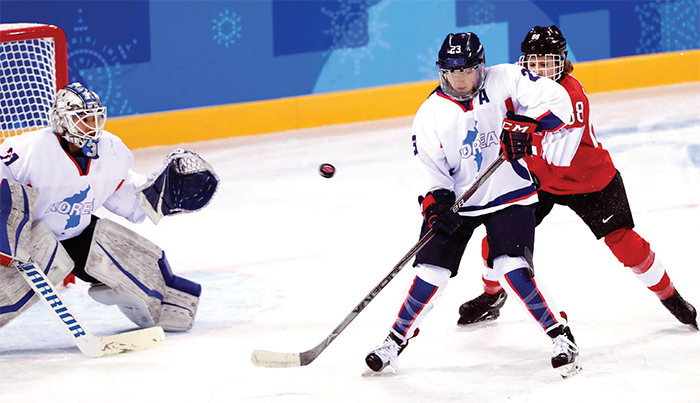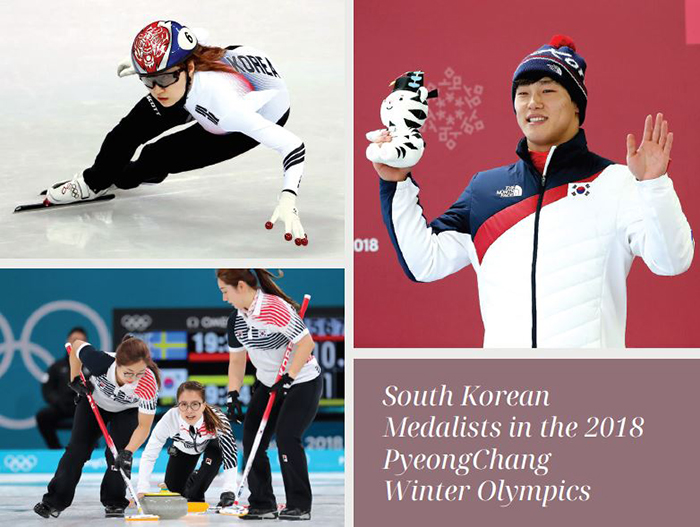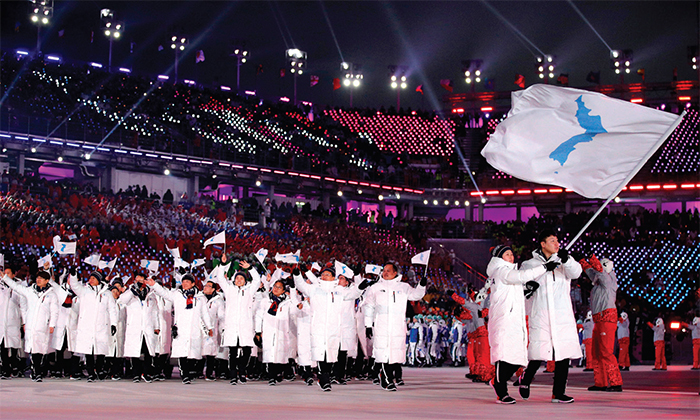
Joint inter-Korean women’s ice hockey team. Korea’s unified women’s ice hockey team at the 2018 PyeongChang Winter Olympics.
Pyeongchang, Gangwon-do Province, was selected as the host city for the 2018 Winter Olympics after receiving a majority vote at the 123rd IOC Session held on July 6, 2011. It was South Korea’s third attempt.
The PyeongChang Olympics, which was held from February 9 to 25, 2018, was the largest Winter Games ever, drawing 2,920 participants from 92 countries including six nations debuting in the Winter Olympics―Nigeria, Eritrea, Malaysia, Singapore, Ecuador, and Kosovo. Three world records and twenty-five new Olympic records were set, thanks to the excellent ice quality. Ticket sales were also considered a success, with some 1,080,000 tickets sold.

(From top left, counter-clockwise)
1. Choi Min-jeong (Short Track). Choi took two gold medals with dominating races in the women’s 1,500 and 3,000m relay despite getting disqualified from the 500m race.
2. Women’s curling. The five-member team of Kim Eun-jung, Kim Kyeong-ae, Kim Seon-yeong, Kim Yeong-mi, and Kim Cho-hi received international attention with their stunning performance. The so-called Team Kim advanced to the finals after beating traditionally strong teams and claimed a silver medal after losing to Sweden.
3. Yun Sung-bin (Skeleton). Yun became skeleton’s new king at the 2018 PyeongChang Winter Olympics as he won a gold medal by the largest margin in any Olympic sliding race.

South and North Korean athletes jointly enter the opening ceremony of the 2018 PyeongChang Winter Olympics.
PyeongChang was the first Olympics to adopt 5G technology, 360° virtual reality (VR), glassless 3D, and holograms. It also utilised the Internet of Things (IoT) and mobile app. On top of that, a total of 85 robots, including guides, food service, and mannequin robots, were deployed to the venues, demonstrating the country’s innovative prowess. CNN reported that “5G is helping make PyeongChang the most high-tech Olympics ever.”
Above all, the PyeongChang Olympics will be remembered by the world as the “Peace Olympics” that embodied the value and spirit of the Olympics. North Korea sent the largest delegation ever to the Winter Games including 22 players, 229 cheerleaders, and 27 high-ranking officials. The two Koreas made a joint entrance and competed as one team in the women’s hockey for the first time in Olympic history. Pope Francis said, “The fact that both Koreas compete as one team under the Korean Unification Flag gives hope for a world in which conflicts are peacefully resolved.” Thomas Bach, the president of the International Olympic Committee (IOC), also commented, “The Olympic Games of PyeongChang 2018 are the games of new horizons. We have seen how sport can make the world a better place.”
PyeongChang 2018 was also a cultural Olympiad where the Hallyu and traditional culture harmoniously blended. During the Olympics, the country operated a total of 1,800 cultural programs including K-pop concerts, traditional performances, and video arts with some 960,000 people in attendance.
IOC President Thomas Bach praised the PyeongChang Games as “the best Winter Olympics ever,” and Toronto Star even said, “The problem with PyeongChang is that there aren’t any problems.” In the overall medal standing, South Korea ranked 7th with five gold, eight silver, and four bronze medals. The country earned medals not only from ice sports but also from other categories like skeleton, bobsleigh, and curling, diversifying its winter sports portfolio. At the Paralympics, South Korea finished in 16th place, with a gold medal in a sitting cross-country skiing event.
South Korea became a country that has hosted both Summer and Winter Games, 30 years after the 1988 Seoul Olympics. It also joined the club of those who have hosted the world’s four biggest sporting competitions― the 1988 Summer Olympics, 2002 FIFA World Cup, 2011 International Association of Athletics Federations (IAAF) World Championships, and 2018 Winter Olympics.
